Truthdiggers of the Week: Frontline Ebola Responders
Doctors Without Borders was on the scene in West Africa six months before the U.N. declared the outbreak a "threat to international peace and security."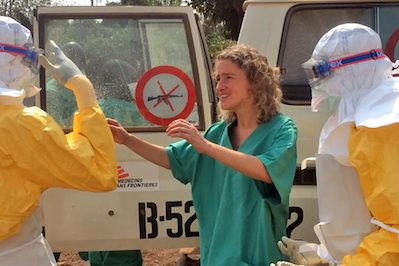
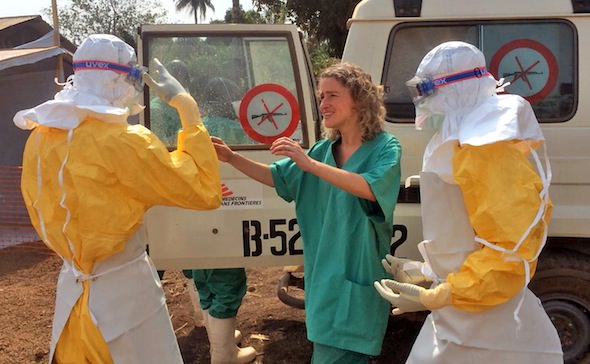
Health care workers from Doctors Without Borders prepare isolation and treatment areas for their Ebola operations in Gueckedou, Guinea. AP/Kjell Gunnar Beraas, MSF
Every week the Truthdig editorial staff selects a Truthdigger of the Week, a group or person worthy of recognition for speaking truth to power, breaking the story or blowing the whistle. It is not a lifetime achievement award. Rather, we’re looking for newsmakers whose actions in a given week are worth celebrating.
On Sept. 19, the deadly Ebola virus entered the United States via Liberian native Thomas Eric Duncan. On Oct. 8, Duncan joined the conservatively estimated 4,500 people who have been killed by the virus since it became a recognized plague in West Africa in March. The days that followed saw two American nurses who had attended to Duncan in the Texas hospital where he was admitted diagnosed. As of today they remain alive, but the fact that they were infected has caused mass unease over the prospect that the deadly contagion will gain a foothold nationwide.
The nightmares are well founded. The disease, for which there is no known cure and no clinically available vaccine, begins with a sore throat, muscle pains, fever and headaches, and ends with the failure of the liver and kidneys and massive internal and external bleeding. The infected do not die comfortably. Even so, there are reasons to believe mass fear over the disease is overblown. Standard medical precautions appear to be adequate to prevent its spread, and reports suggest those standards were not sufficiently observed in the cases that sprang from contact with Duncan.
Still, if the international response does not improve, the U.S. Centers for Disease Control and Prevention predicts the world could see 1.4 million cases of infection by late January. And if societies in West Africa and beyond grind to a halt while the disease spreads, Ebola’s economic impact could kill more people than the virus itself, in addition to profoundly disrupting the lives of affected people.
Both the local and global population’s first defenses against those horrifying scenarios are the groups and individuals risking their lives to contain the scourge. According to the World Health Organization, leading the effort is the categorically heroic Doctors Without Borders (known under its original French name as Medecins Sans Frontieres). The humanitarian organization has five treatment centers spread across Guinea, Liberia and Sierra Leone, with an international staff of 210 working with the assistance of 1,650 locals.
The group has exceeded its medical function as well, creating detailed maps of the impacted areas that are being used by other responding organizations, including the Red Cross. The group showed up at the start of the epidemic and has pushed governments and agencies around the world to respond. Its tone has not always been reserved or polite. Nor would one expect it to be. In addition to the thousands of West Africans killed, at least 16 of the organization’s members have been infected with the disease, nine of whom have died from it. At a U.N. briefing Sept. 2, Doctors Without Borders President Joanne Liu criticized the nonresponse from member countries and the organization as a whole, which declared the outbreak a “threat to international peace and security” only on Sept. 18.
“Six months into the worst Ebola epidemic in history, the world is losing the battle to contain it,” Liu said. “In West Africa, cases and deaths continue to surge. Riots are breaking out. Isolation centers are overwhelmed. Health workers on the front lines are becoming infected and are dying in shocking numbers. Others have fled in fear, leaving people without care for even the most common illnesses. Entire health systems have crumbled. Ebola treatment centers are reduced to places where people go to die alone, where little more than palliative care is offered. It is impossible to keep up with the sheer number of infected people pouring into facilities. In Sierra Leone, infectious bodies are rotting in the streets.”
President Obama has assured Americans that Ebola will not become uncontrollable in the United States. Seven months after the outbreak, after the disease became a domestic issue upon which his performance will be judged and the future electability of members of his party influenced, he has announced “the largest international response in the history of the CDC.” Others, including Truthdig columnist Sonali Kolhatkar, take a broad view of the problem that includes the context of African immiseration by ongoing forms of Western economic colonialism and the cruel and indifferent negligence of a growing international neoliberal order that lets social problems fester and intensify until they become profitable for capitalists to deal with them.
There are exceptions to this sordid, unnecessary trend, and Doctors Without Borders and all the other responders on the front lines of the Ebola outbreak are among them. They are our Truthdiggers of the Week.
Jan Husar:
RT:
Independent journalism is under threat and overshadowed by heavily funded mainstream media.
You can help level the playing field. Become a member.
Your tax-deductible contribution keeps us digging beneath the headlines to give you thought-provoking, investigative reporting and analysis that unearths what's really happening- without compromise.
Give today to support our courageous, independent journalists.
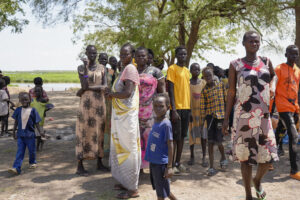
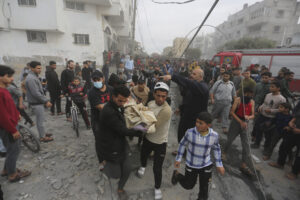
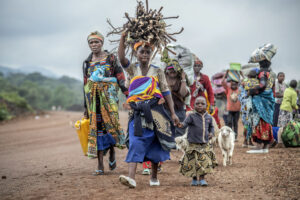
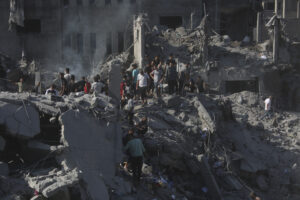
You need to be a supporter to comment.
There are currently no responses to this article.
Be the first to respond.